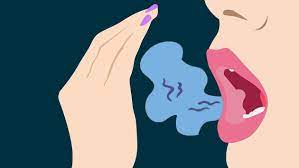Bad breath affects an estimated 25 percent of people. There are a number of possible causes of halitosis, but the vast majority come down to oral hygiene.

It is also known as halitosis or fetor oris. Halitosis can cause significant worry, embarrassment, and anxiety but it is relatively easy to remedy.
What is halitosis?
Although bad breath is associated with certain diseases, oral hygiene is the most common cause.
Bad breath is a common problem that can cause significant psychological distress. There are a number of potential causes and treatments available.
Anyone can suffer from bad breath. It is estimated that 1 in 4 people have bad breath on a regular basis.
Halitosis is the third most common reason that people seek dental care, after tooth decay and gum disease.
Simple home remedies and lifestyle changes, such as improved dental hygiene and quitting smoking, can often remove the issue. If bad breath persists, however, it is advisable to visit a doctor to check for underlying causes.
Treatment
The best method to reduce halitosis is good oral hygiene. This ensures that cavities are avoided and reduces the likelihood of gum disease
It is recommended that individuals visit the dentist for a check-up and cleaning twice a year.
The dentist may recommend a toothpaste that includes an antibacterial agent or an antibacterial mouthwash.
Alternatively, if gum disease is present, professional cleaning may be necessary to clear out the build-up of bacteria in pockets between the gums and teeth.
Potential causes of bad breath include:
Tobacco: Tobacco products cause their own types of mouth odor. Additionally, they increase the chances of gum disease which can also cause bad breath.
Food: The breakdown of food particles stuck in the teeth can cause odors. Some foods such as onions and garlic can also cause bad breath. After they are digested, their breakdown products are carried in the blood to the lungs where they can affect the breath.
Dry mouth: Saliva naturally cleans the mouth. If the mouth is naturally dry or dry due to a specific disease, such as xerostomia, odors can build up.
Dental hygiene: Brushing and flossing ensure the removal of small particles of food that can build up and slowly break down, producing odor. A film of bacteria called plaque builds up if brushing is not regular. This plaque can irritate the gums and cause inflammation between the teeth and gums called periodontitis. Dentures that are not cleaned regularly or properly can also harbor bacteria that cause halitosis.
Read Also: Top 10 Container Shipping Lines On Track For $115-120 Billion 2021 Profit: Alphaline
Crash diets: Fasting and low-carbohydrate eating programs can produce halitosis. This is due to the breakdown of fats producing chemicals called ketones. These ketones have a strong aroma.
Drugs: Certain medications can reduce saliva and, therefore, increase odors. Other drugs can produce odors as they breakdown and release chemicals in the breath. Examples include nitrates used to treat angina, some chemotherapy chemicals, and some tranquilizers, such as phenothiazines. Individuals who take vitamin supplements in large doses can also be prone to bad breath.
Mouth, nose, and throat conditions: Sometimes, small, bacteria-covered stones can form on the tonsils at the back of the throat and produce odor. Also, infections or inflammation in the nose, throat, or sinuses can cause halitosis.
Foreign body: Bad breath can be caused if they have a foreign body lodged in their nasal cavity, especially in children.
Diseases: Some cancers, liver failure, and other metabolic diseases can cause halitosis, due to the specific mixes of chemicals that they produce. Gastroesophageal reflux disease (GERD) can cause bad breath due to the regular reflux of stomach acids.
Kindly like us on Facebook















Discussion about this post